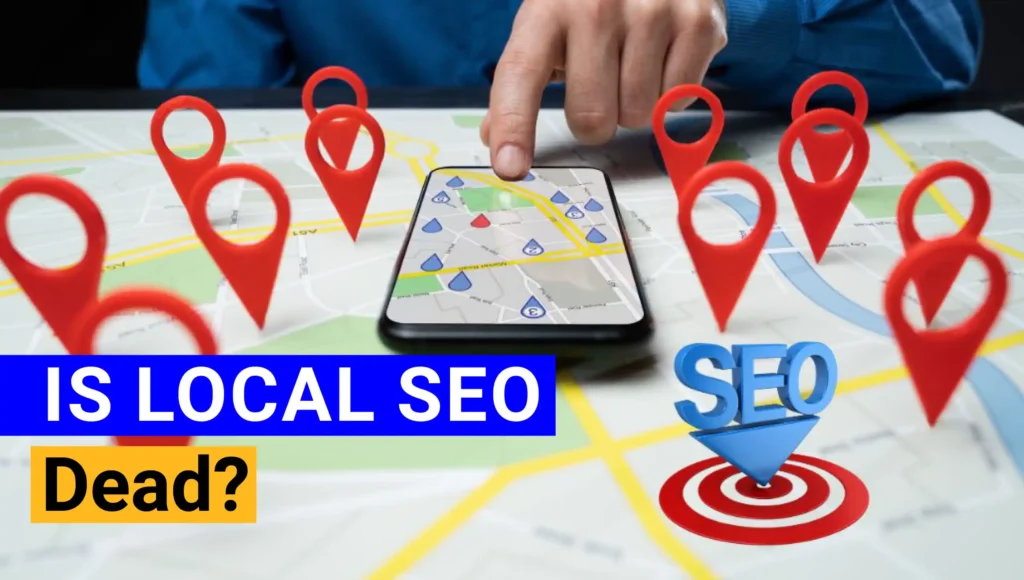Data-based revolutions with algorithms are ever-changing in digital marketing. Now, many are wondering about the future of traditional strategies like local SEO. “Is local SEO dead?”Is something that has been on the mind of most marketers, business owners, and SEO professionals recently. While much of the digital landscape has evolved over time, the significance of local SEO for small businesses is unavoidable. So, is local SEO a good vehicle for businesses during 2024 and beyond?
What Is Local SEO?
Local SEO is an advanced type of SEO that is aimed at attracting local customers by optimizing a website or an online presence. These include strategies and tactics used to make a business show up for local search results on search engines such as Google.
Local SEO is essential for businesses that only operate in a particular region or serve customers within that area, e.g., restaurants, retail outlets, medical professionals, among others. Local SEO is the process of optimizing your online presence to attract more business from relevant local searches.
Key Components of Local SEO
Optimizing Google My Business: Creating and maintaining a Google My Business (GMB) profile is essential for local SEO. This ensures your business shows up in Google Maps, includes your correct contact information, can reply to reviews, and you can post updates to it.
By including location-based keywords in your website content, titles, meta descriptions, and blog posts, it signals to search engines your business’s geographic relevance.
Local Citations: Consistent business information (name, address, phone number) listed around the web in other directories and platforms is crucial. This increases the likelihood of search engines having confidence about your business location.
Customer Reviews Positive customer reviews on platforms such as Google, Yelp, and Facebook indicate to search engines that customers in the area trust your business.
On-Page SEO: There are a few different ways; you can add the names of cities or neighborhoods to a page on your website, optimize your on-page SEO, and ensure your website is mobile-friendly and doesn’t have lots of dangling links.
These techniques enable local SEO to assist business owners in increasing their local search rankings, resulting in more foot traffic, phone calls, and online conversions for them.
This is why people say local SEO is dead
Artificial Intelligence and Voice Search: AI and voice search are frequently blamed as the death knell for local SEO. Voice search using virtual assistants like Siri, Alexa, & Google Assistant is changing the way users search for local businesses. With these tools, users don’t have to click on a search result; they get the answer immediately.
Or would asking such a thing as “Where’s the closest coffee shop?” offer a verbal answer instead of a set of clickable search results. Katja recently commented on this trend towards direct answers, which has led some to think that traditional search results and local SEO are dying.
Changes to Google’s Algorithm: The evolution of Google algorithms as introduced by local packs, Google maps, and Knowledge Graph, for example, has made conventional local SEO practices less useful. Many businesses realize that the days of concentrating on SEO-rich keywords or backlinks are out the window.
But Google now focuses on user experience, authority and real-time relevance, which makes SEO practices that used to work less effective and efficient. This begs the question: is local SEO dead, or is it just as important as it always has been?
Big Players Are Dominating: Many people search for information on a website rather than visiting the local company in their neighborhood, resulting in a big player being extremely favored to create the most search engine results for their industry due to having deep pockets to invest in well-optimized content-rich websites and advertising campaigns.
Local businesses are pushed out of search and only the biggest competitors are visible, and now some people have started wondering whether, in fact, local SEO is worth it for smaller businesses.
What’s Replacing the Old Local SEO?

Although local SEO as we once knew, is changing, it’s not gone. The truth is, emerging systems are naturally supplementing local businesses discoverability and local engagement. Here’s what’s replacing, or evolving along with, traditional local SEO.
User Intent for the Win: In the 2024 Google algorithm update, everyday simply keywords, which used to be the focus of the search engines, are left in the dust, and they pay more attention to the user intent. Google’s understanding of context has matured, so it isn’t as simple as optimizing for “plumber in [city]” anymore.
It is crucial for businesses to know what type of searches their potential customers are making and what they can do to fulfill those needs. For instance, targeting “emergency plumber” or “affordable plumber” would be intent over just location. All of this means that how a business approaches SEO must shift as well.
Modern Local SEO Techniques for Google’s Knowledge Graph and Local Pack Despite many changes to local SEO tactics, two features of Google, its Local Pack and Knowledge Graph—have remained mainstays. These tools provide fast and relevant answers to users who are looking for services in the surrounding area.
It is still possible for local businesses to show up in these packs, but this goes beyond just targeting keywords. Their Google My Business (GMB) profile must be fully optimized and correct; they must reply to customer reviews, and they should provide relevant and high-quality content that matches with the search intent.
Mobile-First and Voice Search Optimization: Mobile searches are high in every searching activity, so searching for your clone must be mobile-friendlier. Websites that are mobile-friendly and easy to navigate will perform better in terms of ranking.
Likewise, the need to optimize for voice search—typically more conversational phrases—is a growing priority. This is especially important for local businesses, as a huge percentage of voice searches have local intent. So rather than just typing in “restaurants near me,” users might say to their virtual assistant, “What’s the best Italian restaurant in this neighborhood?”
Customer Reviews and Reputation Management: One of the most crucial ranking factors for local SEO are reviews, reputation management comes along. Customer reviews on sites such as Google, Yelp, and Facebook have a strong impact on local rank. Well, search engines prefer those kinds of businesses that have a good online reputation and have more relevant positive reviews.
As a result, companies are required to interact with consumers, act on comments, and get happy customers to provide testimonies. As the business world becomes ever more digital and forward-thinking, reputation management software is rising in popularity.
Social media—Facebook, Instagram, and even TikTok—have become part of local SEO. In addition to these features, businesses can interact with their potential customers and do location-specific posts and geotargeted ads on these platforms.
Content can also be local to a locality; every business can create content for their business acting like their product or services are best for their surrounding regions, which would increase brand value as well as traffic too. Google also considers social signals in ascertaining relevance and authority, making it even more imperative that your online presence be cohesive, including social media.
SEO and Automated Marketing: AI is not killing SEO but rather improving it. An example would be AI-powered chatbots offering real-time answers to users, which enables businesses to engage their customers on their websites.
AI-powered tools are also enhancing how content is created, how keywords are researched, and even how customers are personalized. Local businesses using AI-based SEO tools can automate sections of their strategy and spend more time on more valuable actions such as writing content, developing links, and engaging with consumers.
Is Local SEO Dead — The Evolution of Local SEO
Originally little more than a fitful endeavor of keywords or backlinks, local SEO has evolved into a complex, fluid discipline. Search engines have evolved (Google especially) to provide relevant, location-based results.
Today, algorithms consider more than just keywords—they also consider signals based on the user experience itself, mobile friendliness, and voice search. Which begs the question for many: “Is SEO dead in 2025?” It’s not a yes or no answer.
Indeed, local SEO has changed a lot. Traditional tactics won’t suffice anymore. But this evolution isn’t killing local SEO. In fact, it’s faring well, but in a more nuanced way. In fact, Google’s own algorithm updates, such as the helpful content update, have heavily favored quality content that aligns with the user’s search intent and focuses on local relevance.
Businesses maintaining high-quality, localized content experience much better results; thus, local SEO is still a serious building block for business success.
Is SEO dying in 2025? The Answer Is No.
With the evolution of new technologies and artificial intelligence, as well as more advanced machine learning algorithms, people have the concern that SEO is something that is fading away. In 2025, a lot of digital marketing professionals are closely monitoring that rise in AI-driven search experiences, like Google’s Bard and chatbots. These technologies allow users to get answers to their questions instantaneously and without clicking on conventional search results.
But all is not lost for SEO; it’s just not dead yet. Certain things will change in the way search results are displayed as a result of AI, but the need to optimize content, structure, and user experience throughout the user’s journey will not change. Local businesses need to follow tailored SEO strategies to get recognized in localized search results, Google Maps, and other such location-based features. Failing to adopt SEO could leave local businesses lagging behind.
As AI technologies become more integrated, the SEO of the future will likely also become more integrated. That means that businesses will have to optimize their content not only for human users but also for AI-driven platforms so that they will remain in sight in an increasingly complex digital sphere.
Why Local SEO Is Still Important in 2025
Is SEO still relevant in 2025? To answer the question of whether SEO will still exist in 2025, we need to look at current trends. Local SEO is and will remain an essential strategy for companies based on foot traffic or localized customers. The first major reason is the rise of mobile search.
A significant portion of today’s searches are done on smartphones, and a great number of these searches are location-based. Someone typing “best coffee shop near me” or “plumbers in [city]” is looking for localized results.
A second key element reinforcing the importance of local SEO is the increasing significance of online reviews and ratings. Customer reviews also influence search engines, including Google, making them a significant local SEO signal.
When small businesses consume local reviews correctly, they can leverage this information to improve their visibility and authority, which in turn results in increased local traffic. This pattern is likely to continue through 2025, so companies able to invest in local SEO will consistently earn returns.
Google My Business: Best Practices for Local SEO
One of the most important tools in local SEO is Google My Business (GMB). This free tool helps businesses manage their online presence across Google, including Search and Maps. Over the years, GMB has grown all the more critical for succeeding with local SEO. In fact, optimizing your GMB profile can increase your search visibility by a substantial amount!
Google’s continuing development of GMB features such as user-generated content and advanced data seems to make the case for businesses to continue improving their profiles. Thus, their information is updated and they are more visible for potential customers to get everything they want to make a buying decision.
Even though Google is developing their platform, GMB remains a major component in local search ranking, so local business search engine optimization will continue to trend in 2025 and beyond!
Should You Invest in SEO for Local Businesses?
For local businesses, SEO isn’t a nice-to-have—it’s a must-have. Brick-and-mortar stores or service-based businesses require a strong online presence. This makes local SEO even more beneficial because local SEO targets the users who are already looking for nearby services or products, therefore increasing the possibility of them becoming your customers.
The question “Is SEO worth it for local businesses? It is a question that can be answered very loudly in the affirmative. Local SEO is a driving force for targeted traffic, increased brand visibility, and ultimately lead generation. SEO has come to be at the forefront of small business measurement, simply because many small businesses that have been toying with this particular medium have seen drastic improvements in acquiring customers and their retention rates as well.
On the other hand, it will be difficult for a business that does not target local SEO to compete with the business that is optimizing for local terms. Without local SEO, even the finest product or service may never be noticed by potential customers.
Is SEO Becoming Obsolete? SEO is not becoming obsolete, but it is transforming. New technologies like AI, machine learning, and changing search algorithms force marketers to adapt.
Final Thoughts: Local SEO Isn’t Dead, It’s Evolving
Long story short, there is nothing dead about traditional local SEO; we are evolving with the technology and user behavior. These days, for the most part, it’s a matter of weaving SEO into mobile optimization, voice search, social media, and reputation management as part of a big, holistic approach to online marketing. Local SEO will never die, but it is indeed changing with the needs of businesses to have access to a mobile, user-oriented, online business ecosystem.
It is important for local businesses to be aware of these trends and use them as a means to gain a competitive edge by producing high-quality and locally relevant content, optimizing for mobile, and engaging customers in order to remain competitive in the local market. Local SEO is not what it was ten years ago but is still an important part of any local marketing strategy.
FAQ
Is local SEO still relevant?
Yes, local SEO is still highly relevant. With the increasing use of mobile search and voice assistants, businesses benefit from optimizing for local search queries. Local SEO helps businesses appear in “near me” searches, driving foot traffic and boosting online visibility within specific geographic areas.
Is SEO still relevant in 2025?
Absolutely! SEO continues to evolve but remains crucial for online success in 2025. As search engines refine algorithms and user behavior shifts, businesses must adapt to new trends like AI-driven search, video SEO, and voice search optimization.
Is SEO becoming obsolete?
No, SEO is not becoming obsolete. While tactics change, the core principles of SEO—creating valuable content, optimizing for search intent, and improving user experience—are essential for ranking well on search engines and attracting organic traffic.
Is local SEO profitable?
Yes, local SEO is profitable for businesses that rely on local customers. By optimizing for location-based searches, small businesses, restaurants, and service providers can see a significant increase in leads and revenue from targeted, nearby audiences.
Which SEO should be avoided?
Avoid black-hat SEO techniques like keyword stuffing, cloaking, and buying backlinks. These tactics can lead to penalties from search engines and harm your site’s long-term performance. Focus on ethical, white-hat SEO strategies for sustainable growth.



